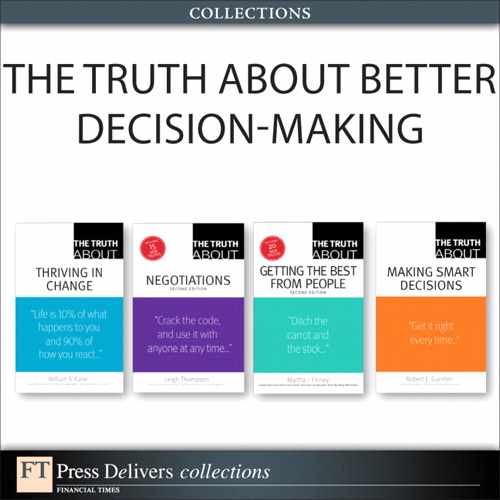Truth 33. Use constructive conflict
There have been few more high-pressure decisions than those made in the U.S. White House in October 1962 during the Cuban Missile Crisis. With surface-to-surface missiles in Cuba pointed right at the U.S. backyard, the intense pressure was the only certainty. As Robert Kennedy commented in his memoir of the crisis, Thirteen Days: "Each one of us was being asked to make a recommendation which would affect the future of all mankind, a recommendation which, if wrong and if accepted, could mean the destruction of the human race. That kind of pressure does strange things to a human being, even to brilliant, self-confident, mature, experienced men. For some it brings out characteristics and strengths that perhaps they never knew they had, and for others the pressure is too overwhelming."19
Sometimes groups can be smarter than individuals, particularly if structures are in place that allow all voices to be heard and their intelligence cleverly pooled. New Yorker writer James Surowiecki points out in his book The Wisdom of Crowds that a group can sometimes be smarter than its individual members.20 This wisdom is seen in the success of Google's search engine, based on the searches of other users. As another example, while experts were correct only 65 percent of the time in answering questions from the game show Who Wants to Be a Millionaire?, the "less expert" TV studio audience guessed right 91 percent of the time. Although groups are susceptible to groupthink and other limitations that make them less smart than individuals, Surowiecki points out that "under the right circumstances, groups are remarkably intelligent, and are often smarter than the smartest people in them."21
Sometimes groups can be smarter than individuals, particularly if structures are in place that allow all voices to be heard and their intelligence cleverly pooled.
Early in the crisis, President John F. Kennedy assembled his top advisors and asked them to work in small groups to develop independent recommendations, including talking points for a speech to the nation explaining the move and possible contingencies. The resulting plans ranged from a direct military attack on Cuba to a naval blockade of Soviet ships headed to the island. Despite differences in rank, the participants in the discussion all "spoke as equals." The president ultimately made the choice from the options, choosing a naval blockade of Soviet ships headed to Cuba as a first course of action. This still left open the option (and threat) of subsequent military action if the blockade was unsuccessful. This was a decision—and a series of subsequent decisions that followed—where the fate of the world was in the balance. The decision had to be right.
John F. Kennedy had learned from the disastrous decision he made earlier to launch the Bay of Pigs invasion of Cuba in 1961. This was a decision in which groupthink ruled the day. The plan was to train Cuban exiles to launch an attack on Fidel Castro's communist regime in Cuba. The decision was made by a group of top advisors to the president who came from very coherent backgrounds (similar universities) and who were reluctant to challenge him. None of the advisors felt comfortable in talking about the flaws in the plan, so it proceeded.
Few decisions are so overwhelming in their implications, yet almost every decision carries with it an opportunity to use constructive conflict. There are different types of conflict. Distinguish between destructive conflict in groups, which is often personal or politically motivated, and constructive conflict that helps to surface differences of opinion and goals. Harnessing this constructive conflict can lead to better decisions.
